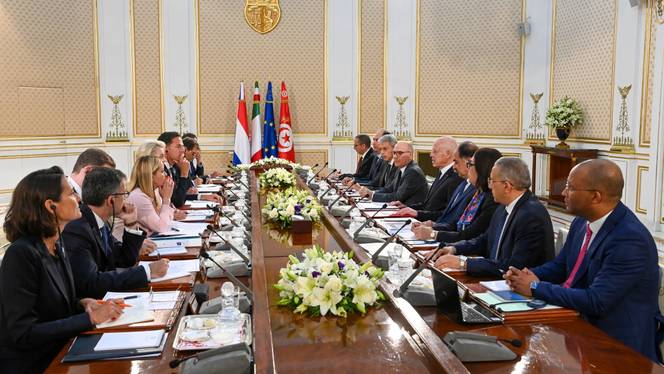THE EU has extended significant financial assistance to Tunisia in an effort to strengthen its economy and address the issue of irregular migration across the Mediterranean Sea. Tunisia, facing economic challenges and in discussions for a potential bailout loan from the IMF, serves as a gateway for migrants and asylum-seekers attempting perilous journeys to Europe.
During a joint visit with the Prime Ministers of Italy and the Netherlands on Sunday, the President of the European Commission, Ursula von der Leyen, announced that the EU is prepared to provide Tunisia with a package worth $968 million, along with immediate support of $161 million. The funding aims to assist Tunisia not only with trade and investment but also with border management and combating human trafficking. For this year alone, a support package worth $107.5 million will be allocated to these efforts.
Von der Leyen highlighted the shared interest of the EU and Tunisia in dismantling the exploitative operations of smugglers and traffickers. She expressed her concern over the deliberate endangerment of human lives for financial gain, saying, ‘It is horrible to see how they deliberately risk human lives for profit.’ In addition to financial aid, the EU intends to assist Tunisia in exporting clean renewable energy to the bloc and establishing high-speed broadband infrastructure, aiming to generate employment opportunities and stimulate economic growth within Tunisia.
Following her discussions with President Kais Saied, Von der Leyen expressed hope that an EU-Tunisia agreement could be finalised at the upcoming European summit later this month. She underlined the EU’s commitment to supporting Tunisia’s democratic path and acknowledged the country’s challenging journey since the Arab Spring uprisings in 2011.
Von der Leyen’s visit to Tunisia included the participation of Italy’s Prime Minister Giorgia Meloni and Dutch Prime Minister Mark Rutte. The three leaders engaged in talks with President Saied, who has assumed significant governing powers over the country since 2021. In response to the mounting pressure on EU governments to reduce migrant arrivals, measures were recently agreed upon to expedite the return of migrants to their countries of origin or transit countries deemed ‘safe,’ including Tunisia.
Critics, such as the Tunisian Forum for Economic and Social Rights, denounced the visit by the three European leaders, viewing it as an attempt to pressure Tunisia through financial support in exchange for intensified border control. President Saied, speaking in Sfax, a coastal city from where many migrants depart, stated his refusal to transform Tunisia into Europe’s ‘border guard.’ However, he acknowledged the need for ‘urgent measures’ to address the migration issue.
Tunisian rights groups accused President Saied of engaging in hate speech after he claimed in February that ‘hordes’ of sub-Saharan African migrants were responsible for increasing crime rates and posed a ‘demographic’ threat. Following his remarks, attacks on migrants surged, resulting in the departure of thousands from the country.
Tunisia, located less than 150 kilometres from the Italian island of Lampedusa, has long served as a stepping stone for migrants, predominantly from sub-Saharan African countries, in search of better opportunities in Europe.















































